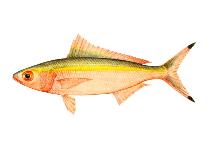
|
Pterocaesio capricornis Smith & Smith, 1963 Capricorn fusilier |

|
|
photo by
FAO |
| Family: | Caesionidae (Fusiliers), subfamily: Caesioninae | |||
| Max. size: | 21 cm TL (male/unsexed) | |||
| Environment: | reef-associated; marine; depth range - 20 m, non-migratory | |||
| Distribution: | Western Indian Ocean: east African coast, Seychelles, and the western Indian Ocean islands. | |||
| Diagnosis: | Dorsal spines (total): 10-10; Dorsal soft rays (total): 15-15; Anal spines: 3-3; Anal soft rays: 12-12. Upper body with a chequered, bronzy green yellow and blue appearance. 4 scales on cheek; 24 predorsal scales; scaled dorsal and anal fins; Supra-temporal band of scales confluent at dorsal midline. Upper peduncular scale rows 11; lower peduncular scale rows 15. Post maxillary processes 2; posterior end of maxilla tapered. | |||
| Biology: | Inhabits coastal areas, primarily around coral reefs at a depth of about 20 m. Feeds on zooplankton in midwater aggregations. Oviparous, with numerous, small pelagic eggs (Ref. 402). Rare species (Ref. 6639). | |||
| IUCN Red List Status: | Data deficient (DD); Date assessed: 25 June 2018 Ref. (130435) | |||
| Threat to humans: | harmless | |||